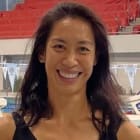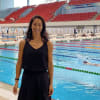Commentary: Singapore’s Olympics selection saga - how did we end up here again?
Singapore swimmers Gan Ching Hwee and Quah Ting Wen are once again at the centre of a selection saga ahead of the upcoming Paris Olympics. Four-time Olympian Joscelin Yeo, who was on the Singapore Aquatics’ Executive Committee in 2021, weighs in.
.jpg?itok=4zaZA7ww)

This audio is generated by an AI tool.
SINGAPORE: The Olympic Games take place once every four years. “Citius, Altius, Fortius - Communiter” is the motto of these Games. Translated from Latin, it means “Faster, Higher, Stronger - Together”.
Not only do the top athletes of the world come together to compete on this global stage, it’s also an event where the ideal that sports should be made accessible to people from every country is exemplified. In the past week, there’s been significant public interest and debate surrounding the selection and de-selection of national swimmers Gan Ching Hwee and Quah Ting Wen for the upcoming Paris Olympics.
There have been multiple articles on this, so I won’t rehash the details. But in summary, Quah was initially set to represent Singapore in the women’s 4x100m medley relay. At the 11th hour, however, due to various permutations stemming from Olympic qualification rules, Quah’s spot was rescinded and Gan was selected instead.
As an ex-athlete, I deeply empathise with the pain Quah is experiencing. The grind of working towards a goal. The exhilaration of qualifying with your teammates, only to be told you can’t go, crushes you in a way that is life-changing. It makes you question the years you’ve dedicated to being the best that you can be. The time committed to this cause cannot be retrieved, and the sacrifices and things in life that you had put on hold feel like they were all for nothing.
My big question is: How did this happen again? How can the same scenario happen for the second successive Games?
After the debacle surrounding the same two swimmers in the Tokyo Olympics in 2021, I was sure a revised selection criteria would have been put in place that was airtight. How are we then facing the same saga?
TWO OLYMPICS "SWITCHEROOS" IN A ROW
Three years ago, a similar “switcheroo” situation occurred with a last-minute invitation from World Aquatics. At the time, I was on the Singapore Aquatics’ (SAQ) Executive Committee and privy to the communications.
The Olympic qualifying criteria for Tokyo 2021 stated that all Olympic Qualifying Times (OQT) and Olympic Consideration Times (OCT) invitations would be sent out on the same day. When that deadline passed, SAQ received only two OQT invitations - for Joseph Schooling and Quah Zheng Wen. There were no OCT invitations.
Multiple emails were sent to World Aquatics about whether any of our swimmers would be invited based on their OCT but we did not get a response. Quah Ting Wen was therefore offered the universality spot, a wildcard ticket awarded to nations that are underrepresented in the Olympic Games.
The day after Quah was offered the spot, however, and one day before the deadline for final entries, World Aquatics gave Gan an invitation based on her OCT. SAQ would not be allowed to take both the OCT and the universality spots and had to make a choice. Gan was chosen as she rightfully should have received the invitation first.
Quah appealed, saying that the universality spot took precedence over the OCT, and the SAQ Appeals Committee overturned the Selection Committee’s decision. As a result, Quah went to Tokyo instead of Gan.
When a similar scenario played out last week, digital media was abuzz. It is easy for anyone to voice their opinion online and things can quickly get emotive. But it’s important to look at what the selection criteria actually says, the progression of what transpired as well as the timeline of events.
UNDERSTANDING THE SELECTION CRITERIA
In March 2023, the selection criteria document was released by Singapore Aquatics (SAQ) with four qualifying pathways for the Paris Olympics.
1. The Olympic Qualifying Time (OQT) is set based on the 14th-place timing at the previous Games. Any swimmer who makes this time automatically qualifies. Each event is limited to two per country.
2. The fastest 16 relay teams from the 2023 and 2024 World Championships automatically qualify for the National Olympic Committee (NOC) for that relay. Note that it is the NOC that qualifies for the relay, and not the individual swimmers.
There can only be two relay-only swimmers out of the four. The other two swimmers must qualify for an individual event on their own merit. If there are more than two relay swimmers who have not qualified on their own merit, the NOC may apply for an exception to have more relay-only swimmers, at World Aquatics’ discretion.
3. NOCs without any qualified athlete or relay team may enter two athletes - one man and one woman in one event each. These are called universality places, and they encompass the value of Togetherness in the Olympic motto. Any NOC who has an athlete who makes the OQT may enter one universality athlete in the other gender.
4. The Olympic Consideration Time (OCT) is set at 0.5 per cent off the OQT. Any swimmer who makes this time will be considered for an invitation to compete if there are enough spaces within the quota.
The quota is determined by how many athletes the host country can accommodate. This year the quota for swimming is 852 as compared to the last Olympics where it was 878.
Making the OQT and being top two in the country is clear and straightforward. Where things aren’t so straightforward is points two to four because of the timing in which they are decided and the quota that they need to stay within.
Singapore’s women’s 4x100 medley relay made history by qualifying for the Paris Olympics, by coming in ninth fastest at the World Championships. However, out of the four swimmers, only one (Letitia Sim) had an OQT, and none of the other three received invitations to individual events via their OCTs. This meant that Singapore’s original quartet had more than the allowed number of relay-only swimmers and had to apply for an exception, which they did.
On Jul 3, World Aquatics granted the exception. SAQ and the Singapore National Olympic Council (SNOC) then sent the invitation letter to the relay athletes to sign.
On Jul 5, Gan Ching Hwee was invited by World Aquatics via SAQ to compete in the 1,500m freestyle in Paris. In the invitation letter, World Aquatics stated that they prioritised the OCT, and that if Gan accepted that invitation, their exception for the third relay-only swimmer would be retracted.
Why couldn’t SAQ send both since they had already offered Quah the exception prior to Gan’s invitation? Because they needed to stay within the quota. So SAQ went back to its published selection criteria and made a decision based on that, without bias or influence.
COULD THE SITUATION HAVE BEEN AVOIDED?
For years now, Singapore Swimming had a goal - to qualify for a relay for the Olympic Games. We believed that a team goal would spur many on to believe that they can achieve Olympic glory. We believed that there was positive and transferable power in a team dynamic that would inspire the swimming community to greater goals.
At the last Olympic Games, the relay team missed an automatic qualifying berth by 0.3 seconds. This time, they made sure they didn’t leave any doubt by qualifying ninth fastest in the world.
However, as I shared in the selection criteria above, two out of the four relay swimmers needed to have an OQT and we only had one. Did they fall short? Or were they robbed? This is a tough one. But having to request an exception for the relay to qualify, also in some ways, means that we were not able to actually meet the qualifying conditions.
What could have been done differently?
For this Olympics, when SAQ crafted the selection policy, they specifically put in these points:
- If reallocation of unused quota results in an OCT invitation on Jul 5, that OCT invitation will take priority over universality
- SAQ will not notify any athlete of universality confirmation until such time all OCT invitations are finalised by World Aquatics
- Should an invited relay not have enough qualified OQT and invited OCT athletes to participate, SNOC will request exceptional consideration for additional relay-only swimmers for the relay to participate.
All the athletes should have been well-versed on all the considerations given that the selection criteria were published in March 2023.
On Jul 3, World Aquatics sent out invitations to all those who qualified via OQT amongst the 209 nations. Once those invitations were accepted, they then allocated relay-only spots and waited for acceptance letters. When those were tallied, universality spots were then issued out. Only after those spots were taken up were OCT invitations sent out. All of this had to take place within a four-day window.
Perhaps there should have been a reminder in the athlete agreement that the relay-only spot is conditional until World Aquatics closes the final list and all spots have been allocated
Would that have changed the result? No.
Could SAQ have pre-empted any of it to help prevent last-minute changes to the line-up of athletes? I don’t think they could have, given that the invitations and timeline were not within their control.
However, I believe that communication between the athletes and SAQ could have been clearer and reiterated at each stage of the selection process so that there is no misunderstanding or misinterpretation of the final qualifiers going to the Olympics.
Athletes should also be mentally prepared for changes until the deadline for entries close, as selection timelines are in the hands of World Aquatics and not SAQ.

THE JOY AND PAIN OF SPORTS
There is joy and pain in being a professional athlete. I’ve been on the high of breaking a world record, and also on the low of missing out on a Commonwealth Games medal by 0.3 seconds. It was extremely painful to swallow.
Did I question if this was all worth it? Yes. But only for a while.
When the pain subsides as time passes, we remember the strength, resilience and courage we built along the way, the friendships forged with our teammates, the growth we had as a person and we carry on.
The disappointment from missing out on a major Games is momentary. But how we handle that disappointment will have a long-lasting impact on who we are.
So let us put aside results that cannot be changed and embody the Olympic value of Togetherness as we cheer on our Team Singapore athletes. Citius, Altius, Fortius!
Former national swimmer Joscelin Yeo is a four-time Olympian who also won 40 gold medals in the SEA Games during her 17-year swimming career. Yeo, a former Nominated Member of Parliament, is now the co-founder of Into The Wild, which organises wilderness camps for children.

















